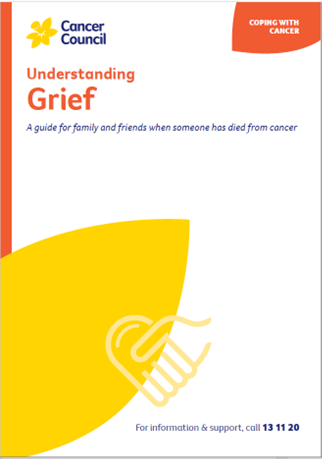- Home
- About Cancer
- Advanced cancer
- Facing end of life
- Caring for someone who is dying
- After the death
- Funeral and religious services
Funeral and religious services
Many people have no previous experience organising a funeral and little knowledge of what to do. Funerals can be an important part of the grieving process. They allow family and friends to share their grief, say goodbye and celebrate the person’s life. Funerals can be personalised to suit cultural or spiritual beliefs.
The executor of the will or a family member usually arranges the funeral service. Most people use a funeral director, who can organise the service, coffin, newspaper notices and flowers, and help with many of the legal responsibilities such as registering the death. You can organise these details yourself if you prefer; you do not need to use a funeral director. If the person has a prepaid funeral plan, it will usually include details of what they wanted and also which funeral director to use. Even if the person has prepaid their funeral plan, they may also have left instructions or talked to you about their wishes.
If you don’t know the person’s wishes, you might need to decide. This can be difficult and stressful, especially as other family members may have different ideas about what should happen. You may choose not to have a funeral or to have an event such as a celebration of life.
Learn how to find a funeral director.
I had promised Mum that after she died, I would make sure she had her favourite lippy on. I did this at the funeral parlour before the final viewing of her body. She was wearing the dress we had chosen together.
Judith
→ READ MORE: Wills and probate
Podcast: Caring for Someone in Their Last Months
Prof Jane Phillips, Head, School of Nursing and Professor, Centre for Healthcare Transformation, Queensland University of Technology and Emerita Professor Palliative Nursing, University of Technology Sydney, NSW; Prof Meera Agar, Palliative Care Physician, Professor of Palliative Medicine, University of Technology Sydney, IMPACCT, Sydney, NSW; Sandra Anderson, Consumer; A/Prof Megan Best, The University of Notre Dame Australia and The University of Sydney, NSW; Prof Lauren Breen, Psychologist and Discipline Lead, Psychology, Curtin University, WA; David Dawes, Manager, Spiritual Care Department, Peter MacCallum Cancer Centre, VIC; Rob Ferguson, Consumer; Gabrielle Gawne-Kelnar, Counsellor, Psychotherapist and Social Worker, One Life Counselling & Psychotherapy, NSW; Justine Hatton, Senior Social Worker, Southern Adelaide Palliative Services, Flinders Medical Centre, SA; Caitlin MacDonagh, Clinical Nurse Consultant, Palliative Care, Royal North Shore Hospital, Northern Sydney Local Health District, NSW; McCabe Centre for Law and Cancer; Palliative Care Australia; Belinda Reinhold, Acting Lead Palliative Care, Cancer Council QLD; Xanthe Sansome, National Program Director, Advance Care Planning Australia; Kirsty Trebilcock, 13 11 20 Consultant, Cancer Council SA.
View the Cancer Council NSW editorial policy.
View all publications or call 13 11 20 for free printed copies.
Need to talk?
Support services
Support for carers
Speak to a health professional or to someone who has been there, or find a support group or forum
Cancer Council Online Community
A community forum – a safe place to share stories, get tips and connect with people who understand
Cancer information
Understanding grief
Read more about what grief may be like after someone has died with cancer
Information for carers
Information for family and friends providing care to someone at any stage of cancer
